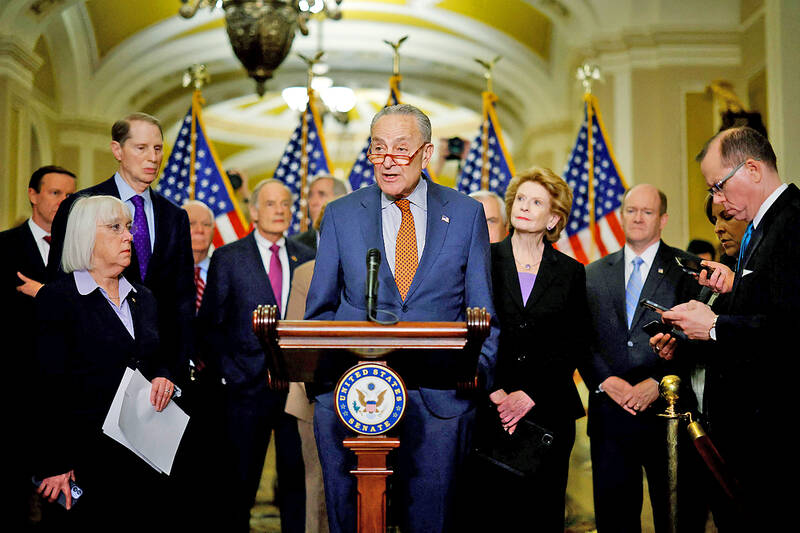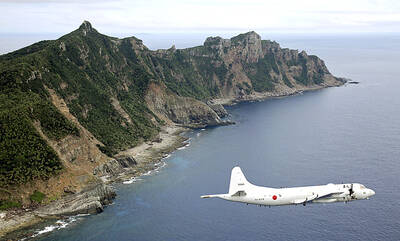US senators announced a major cross-party effort on Wednesday to combat China’s growing global influence by limiting the flow of investment and state-of-the-art technology to the Asian giant, while deterring any potential threat to Taiwan.
The push comes after US President Joe Biden signed a package last year aimed at boosting competition with Washington’s main economic rival, with US$52 billion in new subsidies for microchip manufacturing and scientific research.
Launching the latest legislative drive in the Democratic-led Senate, US Senate Majority Leader Chuck Schumer framed the fight to rein in Chinese President Xi Jinping’s (習近平) Chinese Communist Party (CCP) as an epochal struggle.

Photo: AFP
“The Chinese government is not constraining itself in its pursuit to dominate the 21st century, and if we in America were to rest on our laurels, if we let the CCP beat us, it would have serious consequences for the world’s democratic nations,” he said.
“The United States cannot afford to cede its leadership to governments opposed to democracy and individual liberty. We cannot let authoritarianism call the shots in the 21st century,” he added.
Schumer and 11 of his most senior lieutenants held a news conference to outline a five-step plan aimed at addressing competition from China, which has seen its economy grow more than 10-fold since the turn of the century.
One element of the push would be proposals to deter Chinese aggression against Taiwan, the global leader in manufacturing high-end microchips.
Schumer did not offer specifics, but said the plan would build on bipartisan proposals from the US Senate Foreign Relations Committee, which last year approved US$4.5 billion for Taipei’s defense over four years and affirmed Biden’s power to levy sanctions on Chinese officials and financial institutions involved in actions against the nation.
The New York Democrat said lawmakers would look at export controls and sanctions limiting Beijing’s ability to acquire — “and even steal” — US innovations in artificial intelligence, quantum computing and other advanced tech.
The US Department of the Treasury and the US Department of Commerce would get new authority to screen and halt the flow of cash to China’s high-tech industries, he added.
The drive would also look at assisting small business, building a US workforce “for the future” and strengthening the process for assessing the national security implications of inward foreign investments.
Relations between Beijing and Washington have been declining steadily for years, with the rivals locking horns over trade, human rights and the origins of COVID-19.
Washington has also been a critic of the Chinese Belt and Road Initiative — which has invested US$840 billion in roads, bridges, ports and hospitals in more than 150 nations over a decade — arguing that it lures poor countries into debt traps with huge, unaffordable loans.
Schumer said the US and its allies were ready to cooperate on providing an alternative infrastructure funding source that “actually benefits those countries looking for a helping hand.”
“Bottom line: Time is not on our side. The Xi regime is working every day to catch up and surpass the United States,” Schumer said. “There is no reason our two parties here in the Congress ... can’t come together and send a strong message to the Chinese government that we’re united in this pressing national security effort and we are committed to maintaining America’s lead in the future.”

MISINFORMATION: The generated content tends to adopt China’s official stance, such as ‘Taiwan is currently governed by the Chinese central government,’ the NSB said Five China-developed artificial intelligence (AI) language models exhibit cybersecurity risks and content biases, an inspection conducted by the National Security Bureau (NSB) showed. The five AI tools are: DeepSeek, Doubao (豆包), Yiyan (文心一言), Tongyi (通義千問) and Yuanbao (騰訊元寶), the bureau said, advising people to remain vigilant to protect personal data privacy and corporate business secrets. The NSB said it, in accordance with the National Intelligence Services Act (國家情報工作法), has reviewed international cybersecurity reports and intelligence, and coordinated with the Ministry of Justice Investigation Bureau and the National Police Agency’s Criminal Investigation Bureau to conduct an inspection of China-made AI language

BOOST IN CONFIDENCE: The sale sends a clear message of support for Taiwan and dispels rumors that US President Donald Trump ‘sold out’ the nation, an expert said The US government on Thursday announced a possible sale to Taiwan of fighter jet parts, which was estimated to cost about US$330 million, in a move that an expert said “sends a clear message of support for Taiwan” amid fears that Washington might be wavering in its attitude toward Taipei. It was the first announcement of an arms sale to Taiwan since US President Donald Trump returned to the White House earlier this year. The proposed package includes non-standard components, spare and repair parts, consumables and accessories, as well repair and return support for the F-16, C-130 and Indigenous Defense Fighter aircraft,

CHECKING BOUNDARIES: China wants to disrupt solidarity among democracies and test their red lines, but it is instead pushing nations to become more united, an expert said The US Department of State on Friday expressed deep concern over a Chinese public security agency’s investigation into Legislator Puma Shen (沈伯洋) for “secession.” “China’s actions threaten free speech and erode norms that have underpinned the cross-strait ‘status quo’ for decades,” a US Department of State spokesperson said. The Chongqing Municipal Public Security Bureau late last month listed Shen as “wanted” and launched an investigation into alleged “secession-related” criminal activities, including his founding of the Kuma Academy, a civil defense organization that prepares people for an invasion by China. The spokesperson said that the US was “deeply concerned” about the bureau investigating Shen

DISPUTE: A Chinese official prompted a formal protest from Tokyo by saying that ‘the dirty head that sticks itself out must be cut off,’ after Takaichi’s Taiwan remarks Four armed China Coast Guard vessels yesterday morning sailed through disputed waters controlled by Japan, amid a diplomatic spat following Japanese Prime Minister Sanae Takaichi’s comments on Taiwan. The four ships sailed around the Senkaku Islands — known as the Diaoyutai Islands (釣魚台) to Taiwan, and which Taiwan and China also claim — on Saturday before entering Japanese waters yesterday and left, the Japan Coast Guard said. The China Coast Guard said in a statement that it carried out a “rights enforcement patrol” through the waters and that it was a lawful operation. As of the end of last month,